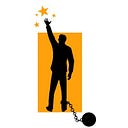Member-only story
Could incarceration be the basis of a powerful voting bloc?
Now is the time to dream big
The hallmark of a democracy is the ability to vote for the people charged with representing you in government. Millions of us choose not to participate — although this month’s election seems poised to break records in terms of turnout (94% of registered voters say they have already voted or plan to, vs. 83% in 2016).
But there are two groups of Americans who long have been denied that basic right of citizenship and suddenly have that opportunity this year: One is incarcerated D.C. residents, thanks to a bill passed by the district council in July. And then there are the “juvenile lifers” who began to be released starting in 2018, thanks to D.C.’s Incarceration Reduction Amendment Act.
Whether still behind bars or recently released, are they taking advantage of this new privilege? Why or why not? And if not, what can be done to turn their numbers into power at the polls?
Here’s what a few of those D.C. men had to say to Rob’s editor and collaborator, Pam Bailey. After all, as the 51 for 51 statehood campaign says in its slogan, “We are D.C.”
